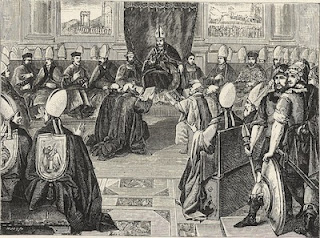There were some more recent and specific items on the agenda for the Council.
An order was put out to arrest a Breton heretic, Éon de l'Étoile ("Eon of the Star"). He considered himself a messiah and supposedly performed miraculous acts like bi-location (appearing in more than one place at the same time), and a heavenly glow that surrounded him. He pillaged abbeys and monasteries and used the plunder to treat the poor to grand feats. He was arrested, tortured until he confessed his messiahship, and imprisoned at the Abbey of Saint-Denis until his death in 1150.
Another heretic discussed was Gilbert, the bishop of Poitiers. Gilbert was more of a gray area. He did not outwardly preach anything heretical or blasphemous, but he was a scholastic and logician who wrote in such a convoluted manner that his works could just as easily lead the faithful astray as educate them. His commentary on Boethius explained the Holy Trinity in a way that did not align with the teachings of the Church. He was brought to a trial shortly after the Council, presided by Pope Eugene. Gilbert was required to rewrite parts of his book, a happier ending than Éon.
There wasn't really a "curse" on the Council, as I said yesterday, but quite unexpectedly (in most cases), several people involved died soon after. The Archbishop of Trier, Albero de Montreuil, was so ill that he had to be carried around (he was in his 70s). He died shortly after, during a visit to Trier by Eugene. The Bishop of Angoulême died right after. On the third day of the Council, Robert de Bethune, the Bishop of Hereford, fell ill and died. Technically, he wasn't supposed to be there: he was one of only three English prelates allowed by King Stephen to attend. Maybe he would have been better off if he stayed home?
Could he have stayed home? Why did Stephen forbid any English prelates to attend—including the Archbishop of Canterbury, Theobald of Bec, putting guards on him—and yet send Robert and two others? What was going on in Stephen's mind? Let's speculate tomorrow.
